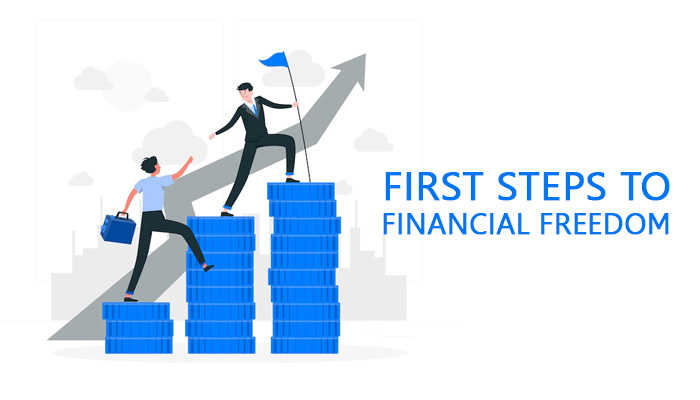After highly publicizing my first post (Thank you, Husband and Mother) and pining all good diamond jewellery designs on Pinterest (if you have read my previous post than you would know what I am talking about), I had to come up with something good which would keep the momentum going. After some thoughts, I decided to write on something basic but essential, something that almost everyone knows but majority don’t implement. So here is my post on ‘First steps to Financial Freedom’.
On a totally different note, Daughter was not amused with the writing of my last post. She thought that I used the words ‘Cheap/Costly’ too many times. So, bear with me while I bring out my Thesaurus and try to use some ‘better’ words.
Here we go …
Creating an Emergency fund is Must!
You should have Emergency Fund of at least 6X your monthly expenses. Keep that money in your bank account or liquid fund, that’s your discretion (see!) but it should be readily available when needed. [That branded handbag (ahem!) or the Watch you loved and want to buy asap is not an emergency though it may feel like one!]
Buy a Term Life Insurance
Life insurance is a crucial product to cover risk for your family’s future. Never mix insurance and investment. Life Insurance should only be bought to cover the risk and not as an investment. Buy Term Insurance immediately if you have dependents and/or have some debt/loan. There are many ways to calculate the amount of Term Insurance you need but the most basic rule is ’10-15X Your Annual Income Plus the amount of Loan/Debt.
Prepare for Medical Emergencies
Invest in a good Health Insurance plan to cover your medical emergencies. Don’t rely on your emergency funds as well as medical cover provided by your employer. Considering the medical expenses these days, medical cover from the employer as well as Emergency funds could exhaust quickly. Select Health Insurance with Critical Illness and Disability rider. (Will write an exhaustive post on ‘How to choose your Health Insurance’ soon.)
Income – Savings = Expense
It’s never Income – Expense = Savings. Savings always come first. Manage your expenses from the amount that is left after Savings. I read this quote somewhere and it stayed with me – It’s not your salary that makes you rich, it’s your spending habits.
How much should you save?
Now the main question is ‘How much should you save?’ Thumb Rule is at least20% of your income. More never hurt though. (If 20% Savings isn’t within your reach yet, don’t feel discouraged. Any Savings is good Savings.)
Savings is not equal to Investing.
Just saving some amount every month is not enough. Invest that money according to your risk appetite. Consult a Professional (ME! ME!). Let your money earn for you.
Start Early
Don’t wait till you reach a certain income level to kick off your financial journey. Begin investing as soon as you start earning. Even a small amount will help you build a good corpus for the future.
Let me cite an example:
Laxmi started investing at the age of 25 while Dhani started at the age of 30. Both invested Rs 10,000 p.m. till the age of 60 and earned 12% ROI. Their corpus at 60 years of age is
| Laxmi | |
| Total Investment | 42 Lakhs |
| Investment Value | 6.4 Cr |
| Dhani | |
| Total Investment | 36 Lakhs |
| Investment Value | 3.5 Cr |
With just 5-year gap in Investment horizon, Laxmi earned Rs. 2.9 Cr more on her investments.
Credit card is not all that bad
All personal finance blogs/ articles will tell you to avoid credit card at all costs. I don’t completely agree with this view. Keeping one Credit Card is okay. Credit Cards are beneficial in some ways. Some payments require credit card, cashbacks are good way to save some money, you can earn air miles on them, get access to lounges at airports. There are many benefits but only if you pay your credit card bills preferably immediately or latest by the month end. Keep a reminder or an alarm for payment but never miss credit card payments. Credit card interest rates are egregiously high and late payments will surely put a dent on your savings. Also make a habit to use credit card only to get extra time for the payments and associated benefits. Do not use credit card for the expenses which you would have not incurred if you didn’t own a credit card.
— X—
– Forum
5,185 total views



Excellent
Wow. Very relatable to each and every individual out there. Good going. Will be looking forward for more posts. 😀
Really got additicted to read ur blogs. Amazing
Amazing didi !! 👏
Torch bearer for someone like me 💫
All the best and i m really looking forward for upcoming posts 😊👍
Thank you so much Diya! You are very kind!
Thank you darling!
Thank you!
Thank you so much,Aadesh!
Good going….. ����Very innovative , simple but informative . ��. 'ye dil mange more!'��